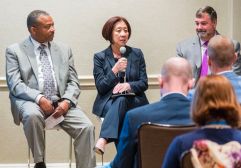The First Responder Network Authority, established by Congress to build a nationwide broadband network for police, fire and other public safety agencies, delivered initial planning checklists to all 50 states on Wednesday, marking an important milestone in implementing one of the key recommendations of the 9/11 Commission.
With the readiness checklists, FirstNet officials also gave specific guidance they said will help planners in Washington, D.C., understand the specific needs of each state and set the stage for the first formal consultations between FirstNet planners and state emergency officials.
David Buchannan, FirstNet’s director of consultation, said the release of the planning documents is an important milestone for developing state plans that will lead to a nationwide public safety broadband network. “We have been collaborating with the states and territories to develop a strong bottoms-up process that will benefit our work going forward,” Buchannan said. “The consultation package is an important building block for the formal consultation process with the states to develop their plans.”
“The release of the initial consultation package is an important next step in our coordination and planning work with the states, as well as implementing FirstNet’s program roadmap,” said TJ Kennedy, FirstNet’s deputy general manager. “Each state plan will be developed through an iterative process, and this package will ensure a strong foundation as we begin consultations with each state and territory so we can hit the ground running.”
Established by the Middle Class Tax Relief and Job Creation Act of 2012, FirstNet is an independent entity within the Commerce Department’s National Telecommunications and Information Administration. The law allocated additional wireless spectrum — the 700 MHz D-Block — to help first responders communicate more effectively during terrorist attacks and natural disasters.
But while FirstNet is a nationwide effort born out of the lessons learned from the Sept. 11, 2001, terrorist attacks, when firefighters, police and other emergency responders experienced communication difficulties, experts acknowledge the network itself will be built at the state level. The goal is to upgrade and transition the more than 10,000 separate, incompatible and often proprietary land mobile radio networks that exist today to a modern, LTE-based network that can handle voice, data and video.
“The key is to deliver a plan to the governor that is not only inclusive of the state’s specific needs and desires, but also one that the governor is eager to sign,” Kennedy said.
The state planning documents come just two weeks after the abrupt departure of General Manager Bill D’Agostino.
FirstNet, however, has continued to build momentum. In March, the authority’s board voted to move forward with a strategic roadmap officials hope will lead to the development of a business plan, including a strategy for staffing and resources. Over the past several months, FirstNet has also built out its senior management team, pulling in experts from industry, government and public safety to lead the organization.
One of its most recent additions is Ali Afrashteh, a former wireless industry executive and consultant tapped to be the organization’s first chief technology officer.




